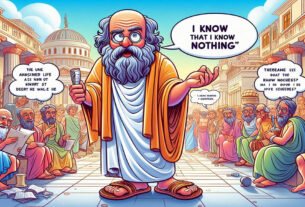Ahhh, Plato… Born in Athens in 427 BCE, this genius was not just a philosopher; he was a builder of ideas, a master of dialogues, and an architect of the soul. Coming from an aristocratic family, his wealth was secondary—his most valuable inheritance was curiosity and a passion for questioning. Beginning his philosophical journey as a student of Socrates, he later founded his own Academy, turning Athens into a center of knowledge.
Throughout his life, Plato pursued a question that was simple yet profound: “Is the reality we see the whole of reality?” And this question leads us to his famous Allegory of the Cave.
🏞 The Allegory of the Cave: The Mind’s First Cinema
In Plato’s Republic, the allegory functions like a mental laboratory. Imagine: a group of people have been chained in a cave since childhood, only able to see shadows cast on the wall in front of them. Yes, a kind of stone tablet cinema—but no 3D, just shadows…
- Here, people learn reality through shadows, never seeing the true forms of objects.
- Plato comments on this:
“Those who are content with shadows are merely prisoners of their senses; the mind exists to break the chains.”
😂 Modern-Day Cave Analogies
- The “perfect lives” we see on social media… actually just shadows on a wall.
- Workplace gossip… discussing shadows instead of real information.
- TV shows, news, popular culture… modern caves that keep our minds chained.
💡 Leaving the Cave: The Sun and Reality
The second stage of the allegory: one prisoner breaks free and steps outside the cave. Here enters the sun. At first, the bright light dazzles and hurts his eyes—experiencing real light and color is unfamiliar. But gradually, he realizes the real world is far more vivid, alive, and free than the shadows ever were.
- Philosophical message: Education leads people from shadows to reality.
- Spiritual message: Knowledge and reason liberate the mind.
- Humorous message: Sometimes, friend, just watching TV isn’t enough to live in the real world! 😏
📜 Plato’s Life and Philosophical Views
Understanding Plato’s life helps us grasp the allegory:
- Influence of Socrates: The method of questioning and dialogue was a foundational element of Plato’s education.
- The Academy: Founded in 387 BCE, Plato’s Academy trained young minds not just with knowledge but with freedom of thought and critical inquiry.
- Theory of Forms: Reality isn’t limited to the world perceived by the senses; the realm of forms and ideas is the key to true knowledge.
📖 Short Excerpts from His Works
1. Republic (Politeia)
“Education is the process of leading the soul from the darkness of the cave toward the light of the sun.”
This sentence summarizes the allegory: true knowledge requires courage and reason.
2. Phaedrus
“When the soul turns toward the light, it sees both itself and the universe.”
Plato unites knowledge and love, describing the learning process as the awakening of the soul.
3. Poetic Touches
Plato occasionally employs a poetic style in his dialogues:
“Break away from the shadows, feel the light; see with the eyes of your heart.”
🌟 Philosophical Implications of the Allegory
- Education and reason: Humans must understand the world not just through senses, but through reason.
- Freedom and courage: Breaking the chains requires knowledge and bravery.
- Reality and illusion: The sensory world is only a shadow of true reality.
- Society and leadership: Enlightened individuals should illuminate society and exercise wisdom in leadership.
✨ Final Words
Plato’s cave is not just a story of ancient Athens; today, we too often settle for shadows. Social media, pop culture, or our own fears can act as chains. But through philosophy, courage, and curiosity, we can break our chains, see the light, and live a richer, more colorful life.
“It is easy to look at shadows, but it takes courage to see the light.” 💖




